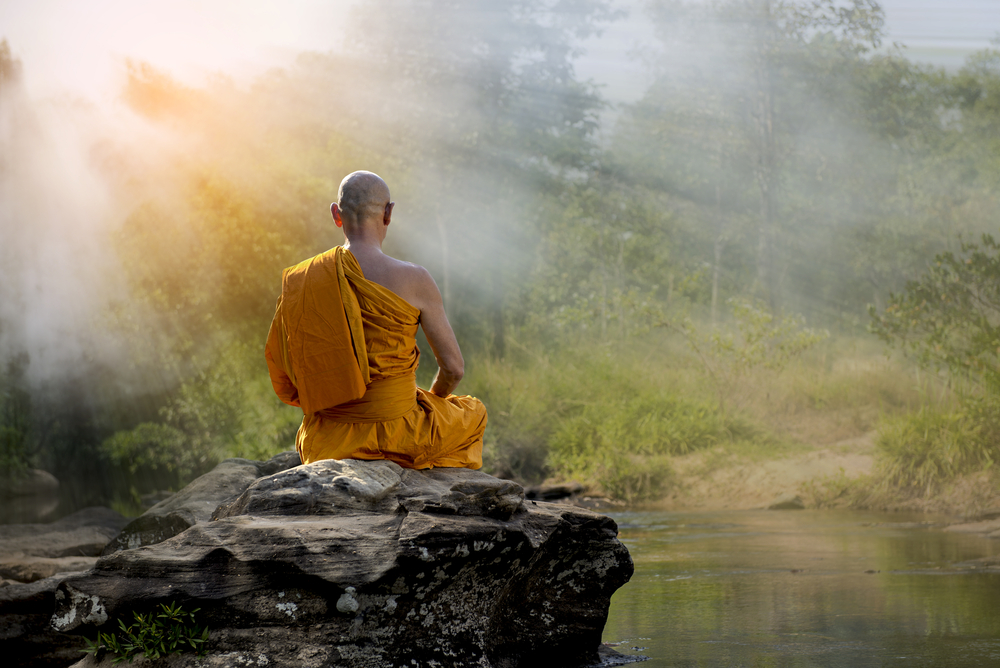Consciousness
Practice This Zen Principle: Mushin

Mushin isn’t the name of a strange, psychedelic mushroom, but it might change your world just as profoundly as a good trip. Mushin is a Zen term that means mind without mind. It is one of the most basic tenets to the Zen Buddhist tradition, and the essence of most martial arts.
“Mu” means emptiness.

The Buddha’s Heart Sutra states,
“Phenomena are not different from emptiness, emptiness is not different from phenomena.”
The Heart Sutra is thought to be the best explanation of the Buddhist concept of emptiness that was ever written. To some it sounds like a “sophisticated form of nonsense,” but that is likely because we have been trained in our culture, to accept all form as reality, instead of understanding that all form arises from this emptiness.
The “emptiness” isn’t really empty, and that’s the rub.
“Emptiness” or mushin (mind without mind) is one of the most misunderstood concepts in the Buddhist lexicon.
The third century Indian Buddhist master Nagarjuna taught, “Emptiness wrongly grasped is like picking up a poisonous snake by the wrong end.” Meaning – if you don’t get this central concept, you’ll miss the teachings of the Buddha entirely.
Previous scholars have confused the idea of mind without mind or the practice of cultivating “no mind” with nihilism – an assumption that life has no meaning, and we are all here for no reason. This couldn’t be further from the truth. Nihilism is a dangerous philosophical slant – because it states that nothing matters – that, like the word “annihilate” which has the same Latin root, meaning “that which does not exist” – we can simply wish away reality. Yet we cannot destroy the emptiness. The Zen concept of emptiness is so vast, and full, it is indestructible. The emptiness, is in fact, all that is real.
The emptiness – or what some have called the unified field in quantum and theoretical physics – contains all possibility for material reality.
John Hagelin, Ph.D, describes the unified field as being the deepest level of the universe. He refers to it as intelligence or a field that has the potential for matter.
The Heart Sutra says, “all phenomena in their own-being are empty.” It doesn’t say “all phenomena are empty.” This is of paramount importance. “Own-being” means separate independent existence. The passage means that nothing we see or hear (or are) stands as an island; everything is a tentative expression of one seamless, ever-changing landscape.
Thich Nhat Han calls this inter-being. Others call it Oneness. It comes from the Zen Buddhist tradition of “dependent co-arising” described in the Paticca-samuppada-vibhanga Sutta.
To begin to understand this, consider that there is no rain without a cloud. There is no cloud without a sky. There is no sky without an atmosphere, and there is none of this without an observer to look at it all – as described in detail in the famous double-slit experiment which proved that everything changes when we look at it. Our consciousness is contained within the “emptiness,” yet our consciousness is also creating the emptiness.
Essentially, when we practice the Zen concept of mushin, we are cultivating an awareness that nothing has value until we place value upon it. This is a key distinction from the nihilistic view.
A martial artist or Zen master who cultivates mushin will have a mind that is open to all possibility – not a mind that is fixated on phenomena as they have previously experienced them, thereby limiting their real-time experience. A mind that is not fixed on specific thought patterns or emotions is more in touch with the “emptiness” from which all arises.
The “empty mind” isn’t one of an idiot. It is the mind of a master. It is unbiased, free, and completely adaptable. When Bruce Lee compelled as all to “be like water” he was reiterating a Japanese Zen saying – “mizu no kokoro” or “mind like still water.”
Like the moon’s reflection in a perfectly still lake, we perceive reality as if it is “real,” but that moon, as realistic as it looks, it only a reflection. It is easily distorted by a small pebble being thrown into the lake, or a slight breeze rippling its surface.
What Bruce Lee meant was, “be like still water,” but don’t ever forget that the reflections which come into your mind – the phenomena – are just that – reflections.
When you practice mushin, you are practicing mind without mind – you are the clear surface. There are fewer distortions. When you eliminate mental chatter, worries, anxieties, and concerns about the future, the lake’s surface becomes smooth like ice. You can see everything around you more clearly.
The practice of mushin allows you to observe the world from a less distorted vantage point. How do you cultivate it? By getting still, and constantly reminding yourself that all that arises is phenomena reflecting like a pebble on the surface of a lake.
(Images: Shuttershock, Red-Lizard.co.uk, Wimbledonzen.co.uk)
Typos, corrections and/or news tips? Email us at Contact@TheMindUnleashed.com
